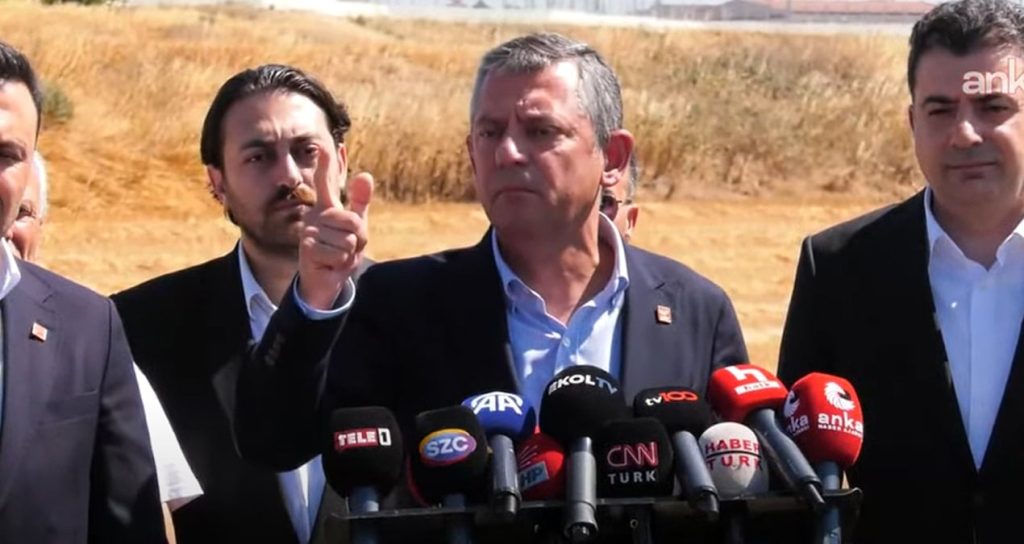In a recent statement, CHP Chairman Ozgur Ozel responded vehemently to the controversies surrounding political threats and justice issues in Turkey. He expressed concerns about threats made towards a woman and her child, and promised to unveil the identities of those involved in the situation. Ozel emphasized the need for justice and the importance of standing firm against political oppression, declaring his optimism for the future despite ongoing challenges faced by the party and its leadership.
| Article Subheadings |
|---|
| 1) Context of the Political Threat |
| 2) Understanding the Impact of Political Restrictions |
| 3) The Allegations Against Political Leaders |
| 4) Reactions from CHP Supporters |
| 5) Future Outlook for the CHP and Turkish Politics |
Context of the Political Threat
The political climate in Turkey has been tumultuous, marked by increasing tensions between various political factions. Recently, CHP Chairman Ozgur Ozel raised alarm over threats directed at a woman and her child, signaling the severity of political intimidation tactics employed in the country. In his statements, he highlighted the psychological toll such threats can inflict on individuals, especially those with families, prompting discomfort and fear. Ozel has vowed to eventually reveal the identities of those responsible, suggesting a possible reckoning for those engaging in such coercive actions. This incident exemplifies a broader atmosphere of fear that can overshadow political discourse in Turkey.
Understanding the Impact of Political Restrictions
In his remarks, Ozgur Ozel alluded to the implications of political restrictions that have plagued Turkey in recent years. He expressed that the absence of political prohibition has allowed him and his colleagues to engage more openly in the political process. Notably, he stated that despite the current challenges, he maintains a sense of positivity regarding the prospects for justice and democratic reclamation. His words resonate with many who believe that political restrictions contribute to systemic injustice and the oppression of dissenting voices. Many supporters of the CHP reflect a collective will to uphold democratic values and push back against authoritarian tendencies, indicating a critical juncture for political engagement within the country.
The Allegations Against Political Leaders
The allegations surrounding political figures, particularly against President Recep Tayyip Erdogan, have gained visibility as Ozel articulated specific concerns regarding the handling of the Kurdish issue and the PKK (Kurdistan Workers’ Party). He noted that Erdogan’s tactics, which include placing certain symbols on the political table, may be seen as disingenuous. Ozel questioned the effectiveness and the intention behind these actions, highlighting that such gestures seem to lack genuine regard for the underlying issues. The critique reflects a palpable discontent with how political leaders are perceived to be managing sensitive ethnic and social tensions, thereby influencing public sentiment and trust in government actions.
Reactions from CHP Supporters
The response from supporters of the CHP has been robust, with many echoing Ozel‘s determination to seek justice. They express a shared apprehension about rising authoritarianism and how it threatens the rights of individuals, particularly vulnerable groups. Grassroots movements within the CHP are keen on advocating for transparency, accountability, and the protection of rights amidst a backdrop of politically motivated threats. In their view, Ozel‘s stance offers hope that the party remains committed to combating oppression and fostering a climate conducive to free expression and democratic discourse.
Future Outlook for the CHP and Turkish Politics
Looking ahead, Ozgur Ozel remained resolute about the CHP’s future. He articulated a vision in which the party continues to strive for power, but not at the expense of the core values it represents. His declaration of optimism for the party’s future amidst current adversities reflects a broader strategy to reclaim political agency and responsibility against prevailing odds. Observers suggest that if the CHP can successfully galvanize support around issues of justice and integrity, it could potentially reshape the political landscape in Turkey, moving towards a more inclusive and fair democratic system.
| No. | Key Points |
|---|---|
| 1 | Political threats are a significant issue affecting individuals, especially families in Turkey. |
| 2 | The CHP’s leadership expresses optimism despite challenges related to political restrictions. |
| 3 | Critiques have been raised against President Erdogan regarding the mishandling of ethnic issues. |
| 4 | Supporters of the CHP advocate for justice and transparency amidst rising authoritarianism. |
| 5 | The CHP plans to reclaim its political agency and responsibility to reshape Turkey’s political landscape. |
Summary
The recent statements by CHP Chairman Ozgur Ozel reflect a tense political environment characterized by threats, challenges to justice, and the struggle for democratic freedoms in Turkey. His comments not only highlight the dangers faced by individuals and families but also underscore a broader determination among CHP supporters to stand firm against oppressive political practices. The outlook remains cautiously optimistic as the party seeks to reaffirm its position and advocate for a more just political landscape.
Frequently Asked Questions
Question: What issues are currently affecting the CHP in Turkish politics?
The CHP is facing challenges related to political threats, restrictions on civil liberties, and perceptions of authoritarianism, which impact its ability to operate effectively.
Question: How does Ozgur Ozel plan to address the political climate?
Ozel aims to maintain a commitment to justice and transparency, emphasizing the importance of standing up against threats and advocating for democratic values.
Question: What are the implications of political threats on public sentiment?
Political threats contribute to a climate of fear and can undermine trust in political leaders, prompting calls for more accountability and integrity within political discourse.


